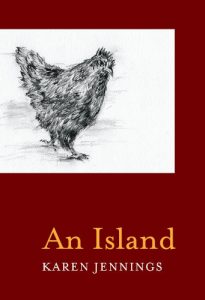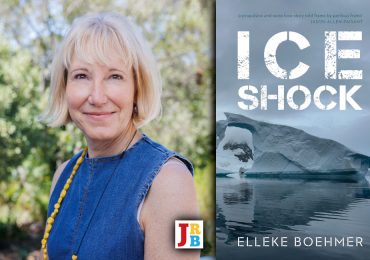The JRB presents an excerpt from Karen Jennings’s new novel An Island, which was recently longlisted for the Booker Prize.

An Island
Karen Jennings
Karavan Press, 2020
Samuel had learnt over the years what an ungrateful place the island was. How difficult to discipline and nurture. The vegetation was unkind, hard in places, soft as ash in others. It spread where it would, taking over as it wished—yet there were stretches of bleakness where the land was bald and unyielding, a thing of sand and rock. The coastline, too, followed this pattern, its boulders a tumble of seaweed and lichen, or else bare of anything but bird shit and clinging shells. Around them kelp stalks rotted, those brown bodies thrashing in the tide beneath the morning’s laggard mist.
When Samuel first came to the island, it was these churning waters that he had feared more than the rest—more than isolation and the strange land. He had said nothing though, had pretended awe at the waves, the vast surrounding sea. The wall, that ever-collapsing wall, had been, perhaps, his attempt at keeping it out, of protecting the land and himself from its onslaught. During the week that his predecessor had introduced him to the island, teaching him the workings of the lighthouse, showing the different shores and beaches, the places to avoid, points of danger, Samuel had felt nothing more threatening than the sea and its relentless approach. He did not like the things it littered on the shore. The plants were easy enough to manage, the smotherweed that choked everything, easy too. It was the sea he wanted tamed.
On a night towards the end of that week, he had been told to dress warmly and to come. He had borrowed an old striped scarf that had once had the badge of a soccer club on it, a team that neither man supported. He was sweating as he followed Joseph down towards the northern shore where the beach was long and narrow, difficult to access from cliff sides made smooth by wind and rain. The old man held a paraffin lantern high for them to see by. The light it cast was dim, turning what it touched into gloom. Samuel struggled to follow, tripping often, and he at one point fell with such a cry that it seemed it must have been heard on the mainland and beyond. Joseph did not falter once, his walk was steady, aided by the stick he carried. He had made it himself, carving a goat’s head for the knob, though the horns and snout were rubbed smooth of details by that time. Samuel had the feeling that the old man normally travelled these paths unlit, that the lamp was for Samuel’s benefit alone.
Joseph led him over rocks and through crevices until they were standing on the pebbled shore. He snuffed the lamp, leaving Samuel staring blindly into the night. Something was moving out there. Something moving across the beach. He could hear it. A sound that made his back grow cold, made the hair on his arms rise. It was the sound of bones.
‘Normally I will catch one,’ the old man whispered. ‘Just one, mind, because to catch any more would be a waste. A man can feed on it for days. I cook it up and put it in the cool box and eat as much as I can manage before it spoils. You don’t want to eat it once it has begun to turn. You’ll be on the toilet for a week.’
Samuel blinked. Before him the movements continued, the strange clacking of bone against bone. He thought of skeletons, of all the dead and drowned of the world washing up on the shore. ‘What are they?’ he asked.
‘What are they? Haven’t you ever seen a crab before? They come here every year at this time, for mating.’
Samuel peered into the night. If they were crabs, they were the largest he had ever seen; not in the rivers of the valley nor the market of the city had he ever seen creatures of this size. They moved in a ghastly fashion, their pale forearms waving, waving as they called on the females to mate. Some of the males had begun to duel, clenching hold of one another, dancing from side to side. Mounds grew where several climbed onto a female, forming a slow-moving many-legged and terrifying monster. Already some of the females had begun to moult, crawling out of their shells, their softness grey in the night. Around them was the clack-clack-clack of fighting, the sound of limbs breaking, shells splintering.
‘No!’ he said when the old man moved away from his side, went towards the spectres. Joseph had brought a small hatchet slung in his belt, and he used it now, bringing it down on a fat body. The crunch of shell breaking was loud across the beach. Even without light, Samuel could see the fractures, the limbs aflail as the old man began chopping off the legs. When he had done, he nodded at Samuel, ‘Right, now it’s your turn.’
‘What do you mean?’
‘There are two of us. We can have two crabs. Get that big one over there.’
Samuel didn’t move, though the old man stood holding the hatchet out to him. ‘Come on, stop wasting time. If you want to live on the island then this is how it is. This is the way we live here. Come on, take it.’
He took the hatchet. It was wet, a little slimy. He moved it to his other hand, brought it down in a trial swing. He tried again as he walked towards a moulting female. When he hit her, there was almost no sound at all, hardly any resistance. The blade went through her, struck the sand far below. He stumbled, righted himself. The soft parts of her had fallen, but the shell continued to stand.
Afterwards Samuel followed the old man back up to the cottage. He carried the lantern now and, like a bundle of wet firewood just collected, the limbs of the two crabs in his arms.
In the kitchen, he watched as the old man began the dissection of the creatures. He cracked the broken shell with his hands and began to pull out meat, pure and white, by the fistful, tossing it into a pot of boiling water for a few minutes before taking it out and replacing it with more. It went on for hours, this process, the table piling up with empty shells, and the smell of the sea hot all round.
As he watched, Samuel found himself deep in the place from which the creatures had emerged, far down in the sunless reaches of the ocean floor, that submerged alien world from which they had made their way to the island for generations. Pushing past the rocks and kelp, the various flotsam and jetsam, moving their ponderous bodies steadily forward, a one-minded approach always to the same point, never altering over the centuries. Some of the crabs were very likely decades old. They were frightening, nightmarish in their size and power. But they were magnificent too, god-like with their mastery of time and sea and land.
Despite his awe, when invited, Samuel took a handful of the cooked meat, sucked the delicate flesh as easily as inhaling. He had never tasted anything as soft. He reached out for more, licking his fingers even as he chewed, eating until the sun rose and he fell asleep still chewing.
The next year he had done it alone and unafraid. And in this way he had continued for fourteen years, only ever taking his allotted one. But still the numbers began to dwindle. Fewer and fewer crabs were returning, until one year they stopped coming altogether.
In the ensuing years, he sometimes took to hovering over rock pools, grabbing crabs no bigger than his palm. He cooked them whole, bit into them to suck out the meat, but found a taste of grainy sand, of rotting seaweed, of rock depths heated by hard sunlight. He craved the monsters of the early years, waited for them, went out at night and called to them by moonlight.
~~~
Karen Jennings holds Masters degrees in English Literature and Creative Writing from UCT, and a PhD in English Literature from the University of KwaZulu-Natal. Her debut novel, Finding Soutbek, was shortlisted for the inaugural Etisalat Prize for Literature. In 2014, her short story collection, Away from the Dead, was longlisted for the Frank O’Connor International Short Story Award. Her memoir, Travels with my Father, was published in 2016. Her most recent novel, An Island, was recently longlisted for the Booker Prize.





